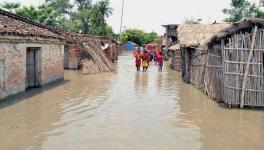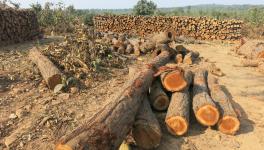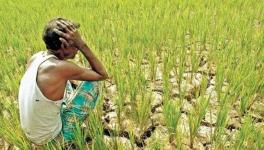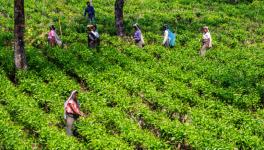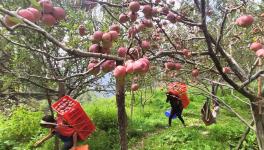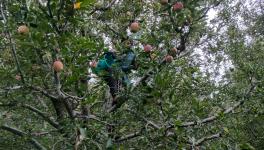Degrowth is Not a Choice Available to Those Impoverished by Capital
Interview with Firoze Manji1
La Décroissance: Faced with global warming, the upholders of green capitalism promote the acceleration of the deployment of technologies and advocate for “sustainable” development. Why has this strategy failed since the beginning of climate negotiations?

Image Courtesy: latuff2.deviantart.com
Firoze Manji: The failure is partly due to the promotion of false solutions but it is also due to the fact that the dynamics of neoliberal capitalism actually exacerbate the problem.
We are living in a period of a major crisis of capitalism characterized by the generalized decline of the rate of profit2.. It is also a period of unprecedented concentration and centralization of capital, with a few hundred corporations controlling every aspect of life, and an unprecedented financialization of capital. The falling rate of profit in production encourages capitalist speculation in credit, property and stock markets -- the unproductive sectors of the economy. We are in an era of ‘take, don’t make’3. Under such conditions, accumulation by dispossession is the order of the day – anything to get a faster rate of return: land grabbing that results in the dispossession of millions of a means of livelihood; elimination of jobs and the reduction in the value of the living wage; natural resource extraction (amputation of non-renewable resources4); commodification of nature so that it too can be a source of profit through speculation; forced opening of territories for exploitation (if necessary through the use of military force). And all of this is making our governments more accountable to corporations, banks and financial institutions than they are to citizens.
Neoliberalism, in a word, is the policy promoted by capital as the solution to the crisis of capital. Capitalism has produced global warming, serious loss of biodiversity, alarming increase in deforestation and desertification, toxicity and pollution of air, water and the soil. With growing public concern about climate change, capital has been desperate to ensure that its thirst for higher rates of profit is cloaked under a ‘green’ mantle. But that green has nothing to do with the conservation of nature: rather it is the green of the US dollar bill.
Resolving the problems of climate change requires long-term and carefully thought-out interventions. But the current desperation of capital for profits militates against such an approach. ‘The rules are short-termism, asset- stripping, rent-seeking, stealing, resource-grabbing, forced distribution from poor to rich, accelerated enclosure and all sorts of new swindles perpetrated under the rubric of “shareholder value”.’5.
In keeping with the prevailing neoliberal ideology, the ‘solution’ promoted as ‘green capitalism’ involves increasing the commodification and financialization of nature, of living things and of ecosystems. ‘Green capitalism’ assumes that everything has a market price, even the regulation of the climate. Green capitalism’s ‘solutions’ include REDD (Reducing Emissions through Deforestation and Forest Degradation), privatization of water, the promotion of industrial agriculture, chaining small farmers to the domination of the agro-industrial complex, investment and promotion of geo-engineering and genetically modified organisms, nanotechnology and so on. Far from reducing emissions, the evidence suggests that these solutions are only exacerbating the problems associated with global warming. This is hardly surprising. As Einstein put it, you cannot solve problems with the same thinking used to create them. At heart, the so-called ‘green economy’ is only a variation of business as usual, that is to say, the drive for economic growth to increase the rate of profit by any means and as fast as possible.
La Décroissance: In Africa, the consequences of climate change are more substantial than in Europe: desertification, water scarcity, food problems etc. What are the main threats?
Firoze Manji: The continent of Africa is one of the most vulnerable of all continents to the impact of climate change. This is due not only to the fact that temperature rises on the continent are expected to be several degrees higher than elsewhere, but also to the economic, social and political devastation that African countries have faced over the last 30 years as a result of the imposition of neoliberal policies. These have left the populations impoverished, vulnerable and already severely impacted by global warming. The wide-scale privatization of the commons, the flooding of African markets with commodities produced in the advanced capitalist countries, the dramatic decline of value-added manufacturing, the removal of subsidies to farmers, the leasing or selling off of vast quantities of the most productive land to transnational corporations for speculation, have resulted in unprecedented levels of landlessness and unemployment. Large regions of marginal agriculture have been forced out of production. With projections of a reduction in yield of food in some countries by as much as 50%, the continent faces serious food insecurity. Even without climate change, it is estimated that more than 25% of the population of Africa (200 million people) already experience ‘high water stress’. Diminishing water tables are already being poisoned by effluents from mineral extraction and industrial agriculture operated by transnational corporations. With current projections of global warming, it is estimated that a further 600 million people are likely to face increased water stress over the next 20 years or so. Low lying lands on the coasts and the small islands are already facing inundations with rising sea-levels, and the situation will get worse over the coming years. Changes in weather patterns have already resulted in unpredictability of growing seasons.6 Ecological stresses as a result of climate change are contributing to conflicts as desertification forces communities to move into more fertile areas imposing on established and settled people, a factor that contributed, for example, to the crisis in Darfur.
La Décroissance: Must we decrease production, consumption, transportation, and reconsider our needs and our economic organization? Do you think that we have to opt for degrowth?
Firoze Manji: When people talk about ‘we’, to whom are they referring? Seen from the perspective of Africa, ‘we’ have suffered from a devastating period of degrowth over the last 30 or more years since the adoption of neoliberal policies by our governments. And what little is produced in Africa – primarily agricultural products, oil and minerals – is virtually all destined for transformation and consumption in the advanced capitalist countries. There is precious little local production to fulfill the needs of the majority of the people of our countries.
To resolve our situation, we need in Africa to increase production and improve transportation and communication so we don’t have to starve, so we don’t have to live in cardboard shacks, so that we have access to clean water and sanitation, so that we can build schools, hospitals and health centers, so that we have decent employment and affordable drugs, food, clothing, housing, to mention only some of the human needs that we currently lack. We need to invest in the infrastructure and means of production of human and social needs to break Africa’s historical and current subordination to the needs of industrialized North. In effect, we need to break with the domination of our economies by transnational corporations and financial institutions.
So in Africa we need growth: not the mythical one measured by GDP growth that reflects the enrichment of the few and the pauperization of the many. We’ve had enough of degrowth.
The choice of ‘degrowth’ may be an option for those, including our elites and middle classes in Africa, who have been brought up with the over-indulgences of advanced capitalism. It is not a choice available to those impoverished by the same system.
The overproduction of commodities, destructive extraction of natural resources, and fierce accumulation by dispossession are symptoms of a system that is desperate to stave off the declining rate of profit. It doesn’t make sense then to treat only the symptoms (degrowth) without addressing the underlying causes (capital accumulation).
La Décroissance: Do you think that there is an elemental opposition between economic growth and ecology?
Firoze Manji: I think there is a fundamental opposition between growth of the capitalist economy and maintaining a balance with the ecosystem of which humans are a part. Ever since its origins, growth of the capitalist economy has always been achieved at the expense of that ecosystem. It has involved enslavement of millions, genocide, colonization, amputation of non-renewable resources, pillage, piracy, militarization, theft, poisoning of ecosystems, loss of species of animals and plants, dispossessions and imprisonment of cultures and societies within capitalist social relations of production, all in the interest of accumulation of capital by a few. The growth of capital has always required enforced degrowth, and resultant impoverishment, of the vast majority of the peoples and economies of the Third World. Many people are finally becoming aware of the cumulative effect of this destructive mode of production on the ability of the ecosystem to renew itself in a sustainable manner, and of the impending threat to the viability of the planet as a living system.
I don’t believe that there is an ‘elemental opposition’ between economic growth and ecology per se. An economy based on meeting the needs (not just material) of all of humanity and of ‘mother earth’ need not necessarily result in disequilibrium within the ecosystem. Having a system in equilibrium – homeostasis – need not necessarily mean that there would be no growth in any part of that system. It may be that a system that is geared towards fulfilling human needs and towards maintaining the equilibrium of the planet’s ecosystem would require some degree of degrowth. But the system we have today is not open to the possibility of equilibrium because its very nature is to use every means possible to allow a minority to accumulate by dispossession and destruction. It is this logic that results in the serious disequilibrium within the ecosystem that threatens its very existence.
La Décroissance: How could we re-organize our societies and our way of life towards simplicity and solidarity? What political actions could we take to massively reduce our energy consumption and abandon the obsession for economic growth?
Firoze Manji: This is not the place for outlining a ‘manifesto’, but let me make some suggestions for discussion. The problems we face have been created and perpetuated by a system that has a voracious appetite for profits without regard to ecological impact. What is frequently forgotten is that this ecology includes human societies. The solution cannot therefore be considered in technological or even technical terms, but rather we need to consider it in social and political terms.
The precondition for the solution to re-establishing an ecological equilibrium has to be the encouragement and nurturing of popular movements, especially amongst those most disenfranchised and impoverished by the system. Without the active participation of the popular masses, we cannot arrive at a solution that overcomes the democratic deficit of the current system.
Perhaps the first step requires public discussion about how do we democratize the economy and the ways decisions are made. Who decides what is produced? Who decides why it is produced, how much is produced, and for whom it is produced? Who benefits from the production that takes place? And what is done with the value so created? Currently a minority makes these decisions without any accountability or even reference to citizens. Public debate on such questions are needed to challenge the ‘right’ of that minority to make decisions that affect the majority. Democratization of every aspect of life – be it about production, distribution, healthcare, housing, sanitation, education, etc. – is fundamentally necessary.
A billion people are considered today to be ‘hungry’ not because there is not enough food in the world but because people, even those who labour in agriculture, are unable to afford the price of basic foods due to speculation on food on the stock markets. This calls for an ending of speculation on food and other basic necessities.
Similarly there is an urgent need for democratization of the management of natural resources. There has already been massive extraction (or more correctly, amputation) of non-renewable resources which are then stockpiled for speculative reasons. Is there a need to continue extraction of non-renewable resources? To what extent can we “Keep the oil in the soil; the coal in the hole” as Nnimmo Bassey has proposed? Similarly, we need to consider what needs to be done about democratization of energy, food production and resource management and so on.
But all these aspects of life are currently controlled by transnational corporations who are backed by the armed might of the imperialist triad – US, Europe and Japan. The struggle for the democratization is inevitably, thus, an anti-imperialist struggle.
Nairobi, June 2015.
This interview was first published in La Décroissance
Disclaimer: The views expressed here are the author's personal views, and do not necessarily represent the views of Newsclick
1 Firoze Manji is the founder and former editor-n-chief of Pambazuka News. He is currently director of the Pan-African Baraza and is based in Nairobi, Kenya.
2 Michael Roberts (2013): From global slump to long depression. International Socialist Journal, 140. http://isj.org.uk/from-global-slump-to-long-depression/
3 ibid.
4 Firoze Manji (2014): Development or amputation: The role of extractive industries. http://www.aljazeera.com/indepth/opinion/2014/08/extractive-industries-…
5 Larry Lohman (2012): Financialization and the green economy: Strategies for NGOs. Heinrich Boll Seminar, Rio de Janeiro, 19 June 2012. http://www.thecornerhouse.org.uk/sites/thecornerhouse.org.uk/files/Fina…
6 Boko, M., I. Niang, A. Nyong, C. Vogel, A. Githeko, M. Medany, B. Osman-Elasha, R. Tabo and P. Yanda, 2007: Africa. Climate Change 2007: Impacts, Adaptation and Vulnerability. Contribution of Working Group II to the Fourth Assessment Report of the Intergovernmental Panel on Climate Change, M.L. Parry, O.F. Canziani, J.P. Palutikof, P.J. van der Linden and C.E. Hanson, Eds., Cambridge University Press, Cambridge UK, 433-467.
Get the latest reports & analysis with people's perspective on Protests, movements & deep analytical videos, discussions of the current affairs in your Telegram app. Subscribe to NewsClick's Telegram channel & get Real-Time updates on stories, as they get published on our website.









